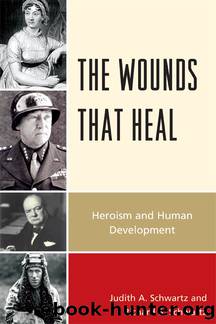The Wounds That Heal by Schwartz Judith A.;Schwartz Richard B.;

Author:Schwartz, Judith A.;Schwartz, Richard B.;
Language: eng
Format: epub
Publisher: University Press of America, Incorporated
Published: 2010-01-01T00:00:00+00:00
Chapter V
Summation
The characteristic of genuine heroism is its persistency. All men have wandering impulses, fits and starts of generosity. But when you have resolved to be great, abide by yourself, and do not try to reconcile yourself with the world. The heroic cannot be common, nor the common heroic.
âRalph Waldo Emerson
Refining the concept with a final, broad range of examples.
The study of heroes is as important as it is problematic. Heroes are not neutral beings whom we study like so many stained shapes on a microscope slide. They are important to us, in many cases desperately so. Heroes and heroines matter. They are the individuals after whom we hope to pattern our own lives, recognizing that we are likely to fall short of their accomplishments. In looking into their hearts, we realize, we are also looking into our own. Harold Lubin writes:
If heroes are symbolic embodiments of our values and beliefs, then it is not surprising that a sober scrutiny of our own heroes can be a disturbing businessâas is every investigation of the values and assumptions by which we live. The study of heroes is one way to learn about ourselves and our world by getting outside of ourselves and looking quizzically at what we are . . . . A thoughtful study of heroes will inevitably raise some of these most basic human questions: Who am I? How did I get this way? What do I want, and how shall I get what I want? What can I learn about myself and my needs from others, from my past, from manâs past?
(1968, pp. 4â5)
We often assumeâcertainly the attitude is made explicit in our cultureâthat success in life can be positively correlated with something called ânormalityâ and with a process entitled âproper adjustment.â Happiness, many would assume, is dependent upon it and those who are âabnormalâ or âmaladjustedâ are frequently seen as struggling with psychological deficits which will impede their quests for happiness. Allowance is made for a certain degree of flair or panache among the demonstrably successful, but as a society we are given to voicing such maxims as âthe bigger they are, the nicer they areâ or that âfor all her power and wealth and influence she is still a real person.â The real person is genuine, which is to say, like us, which is to say, ânormal.â
We are often reminded of the mythological figure Antaeus, son of Poseidon and Gaia, who kept his power only when he remained in contact with his mother earth. Hercules lifted him into the air and crushed him. We praise those whom we consider âdown to earth,â individuals who have maintained their connectedness to their people, to their homes, to their roots. While nature exhibits her power from time to time in destructive ways, we are more comfortable with the cyclic and predictable dimension of natureâs waysâthe workings of what the songwriters Richard and Robert Sherman (in Charlotteâs Web, 1973) call âMother Earth and Father Time,â the nature to which Ecclesiastes
Download
This site does not store any files on its server. We only index and link to content provided by other sites. Please contact the content providers to delete copyright contents if any and email us, we'll remove relevant links or contents immediately.
The Art of Coaching Workbook by Elena Aguilar(50157)
Trainspotting by Irvine Welsh(21063)
Twilight of the Idols With the Antichrist and Ecce Homo by Friedrich Nietzsche(18314)
The Secret History by Donna Tartt(18253)
All the Missing Girls by Megan Miranda(14833)
Cat's cradle by Kurt Vonnegut(14800)
Ready Player One by Cline Ernest(14058)
Talking to Strangers by Malcolm Gladwell(12911)
Fangirl by Rainbow Rowell(8812)
The Compound Effect by Darren Hardy(8539)
Thirteen Reasons Why by Jay Asher(8485)
The remains of the day by Kazuo Ishiguro(8426)
Periodization Training for Sports by Tudor Bompa(7939)
Tools of Titans by Timothy Ferriss(7844)
Wonder by R. J. Palacio(7753)
The Lover by Duras Marguerite(7603)
Change Your Questions, Change Your Life by Marilee Adams(7397)
A Court of Wings and Ruin by Sarah J. Maas(7301)
The Complete Stick Figure Physics Tutorials by Allen Sarah(7159)
